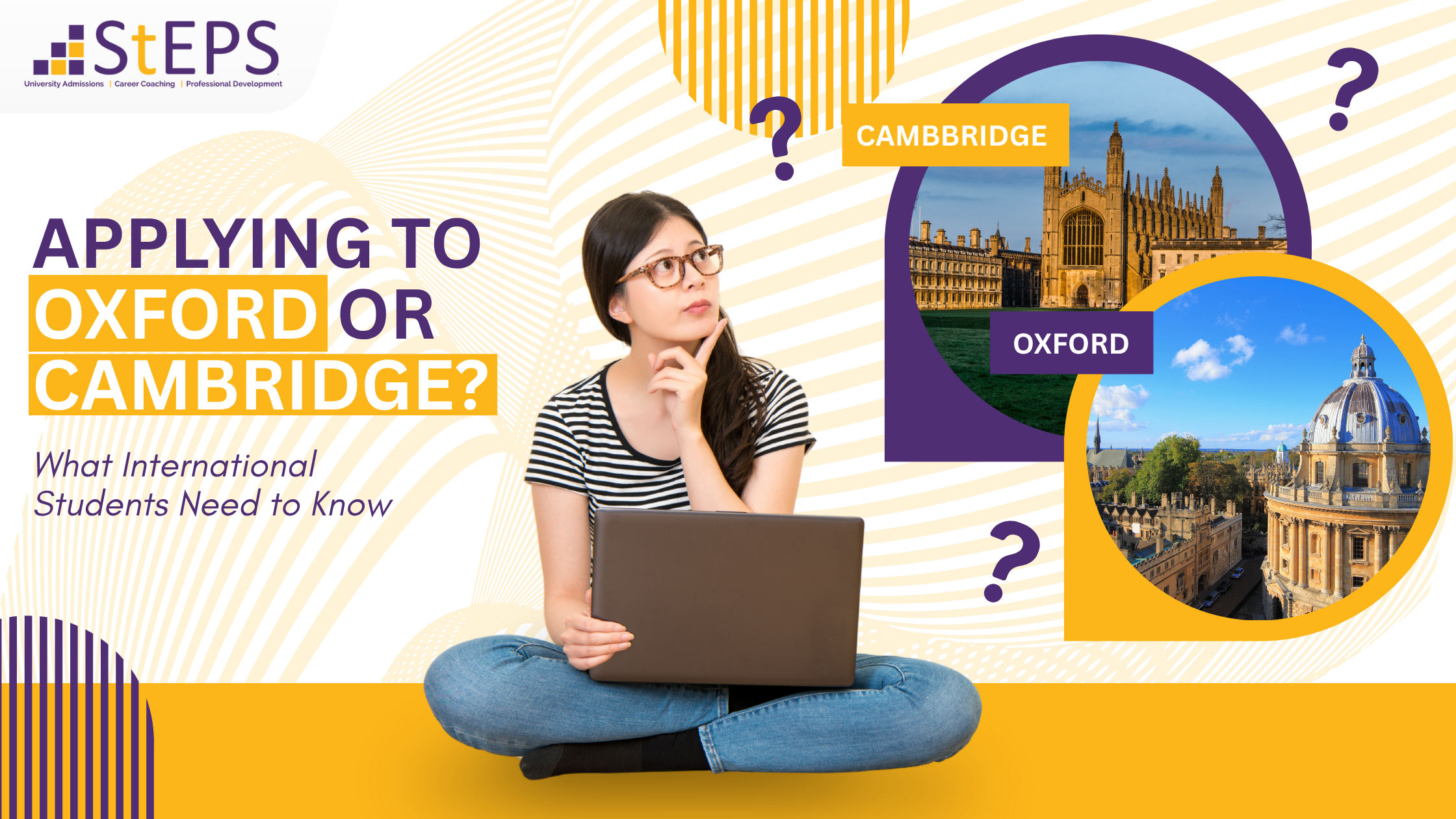The Universities of Oxford and Cambridge are world-renowned for academic excellence, tradition, and intellectual challenge. But applying as an international student involves more than simply submitting an application.
This guide breaks down everything you need to know in detail—from choosing the right course to navigating visa requirements.
1. Oxford or Cambridge? You Can’t Apply to Both
Each year, you can apply to either Oxford or Cambridge, not both, unless you’re applying for specific scholarships (like organ or choral awards). This makes your choice of university critical.
Tips to decide:
- Look closely at course structures: Cambridge often has a broader “Tripos” system; Oxford may be more focused from the outset.
- Review teaching styles, college communities, and location.
- Consider which university offers the best match for your interests in terms of available research areas, optional modules, and course flexibility.
Explore Cambridge: Cambridge Courses
Explore Oxford: Oxford Courses
2. Know the (Early) Timeline
Both universities follow an earlier application timeline than other UK universities. The key deadline is:
- 15 October (6 PM UK time): UCAS application submission
Additional Dates:
- September: Register for required admissions tests.
- October: Sit admissions tests (if applicable).
- 22 October: Submit supplementary materials like the My Cambridge Application.
- December: Interviews take place (often online for international applicants).
- January: Offers released.
Delays or missed deadlines will disqualify your application, so plan carefully.
3. Understand the College System
At both universities, students are admitted to individual colleges, which provide accommodation, pastoral support, and small-group teaching (called tutorials at Oxford and supervisions at Cambridge).
Options:
- Choose a college based on size, location, or atmosphere.
- Submit an open application to be assigned to a college randomly.
Regardless of your college, course content and academic standards remain the same across the university.
Explore colleges:
4. Choose the Right Course—and Meet Academic Entry Requirements
Start by selecting a course you are passionate about, and check the specific academic prerequisites. Both universities are academically rigorous, and both universities look for:
- High academic achievement (typically AAA at A-level, 40+ points in IB, or equivalent)
- Relevant subjects studied at a high level
- Consistent top grades throughout secondary education
For International Qualifications:
Oxford: International entry qualifications
Cambridge: Accepted qualifications
Some courses (e.g., Medicine, Law, Engineering) have particularly strict subject and grade requirements.
5. Prepare a Targeted Personal Statement
The personal statement is your chance to show intellectual curiosity and motivation.
What to include:
- What drew you to the subject
- Independent learning (e.g., books, lectures, projects)
- Research or competitions you’ve participated in
- How your studies relate to your goals
Cambridge may invite an additional mini statement (in My Cambridge Application) where you can tailor your message specifically for them.
Guidance:
- Avoid clichés or excessive storytelling
- Keep the focus academic
- Be honest and specific
6. Additional Forms and Documents
Cambridge:
- After submitting UCAS, you must complete My Cambridge Application, which asks for:
- School transcripts
- Written work (if required)
- Additional statement (optional)
- School system information
Oxford:
- Some candidates may need to submit written work directly to their college.
If you’re applying to Cambridge, My Cambridge Application is mandatory, even for international students. This is due within a week of the UCAS deadline.
7. Prepare for Admissions Tests
Many competitive courses at both Oxford and Cambridge require you to take subject-specific admissions tests.
Common Examples:
| Course | Oxford Test | Cambridge Test |
| Law | LNAT | LNAT |
| Engineering | PAT | ESAT |
| Medicine | BMAT | UCAT |
| Economics | TSA or MAT | TMUA |
| Computer Science | MAT | TMUA or CSAT |
You must register in advance—sometimes via your school or an external test centre.
Oxford test info: Oxford Admissions Tests
Cambridge test info: Cambridge Assessments
8. English Language Proficiency
If English is not your first language, both universities expect you to demonstrate high proficiency.
Common Tests Accepted:
- IELTS Academic
- TOEFL iBT
- Cambridge C2 Proficiency
You don’t always need to submit results at the application stage, but you must provide them if you’re offered a place.
Oxford: English requirements
Cambridge: Language guidance
9. The Interview: More Like a Tutorial
If shortlisted, you’ll be invited to an interview. These are academic conversations designed to simulate the university’s teaching style.
What they test:
- Critical thinking
- Depth of subject knowledge
- Problem-solving ability
- Enthusiasm for learning
Most international interviews are now conducted online, removing the need for costly travel.
Interview help:
10. Tuition Fees and Financial Aid
Tuition Fees:
- Vary by course and citizenship status
- International fees often range from £25,000 to £40,000 per year
- College fees may also apply
Financial Aid:
- Oxford: Offers several reach and merit-based scholarships (e.g., Simon and June Li Scholarship)
- Cambridge: Offers Cambridge International Bursaries and external funding schemes
Explore funding:
11. Visa Requirements
Once accepted, international students must apply for a Student Visa. You will need:
- A Confirmation of Acceptance for Studies (CAS)
- Proof of funds
- Proof of English proficiency
The universities provide help with documentation and compliance.
Visa help:
12. Life as an International Student
Both Oxford and Cambridge are highly international: over 20% of undergraduates come from outside the UK.
You’ll find:
- Culturally diverse student societies
- Dedicated international student services
- Orientation programs and pastoral support
Make sure to explore the student life section on both university websites to get a feel for what to expect.
Final Thoughts
Applying to Oxford or Cambridge as an international student is a bold and rewarding journey. With thorough preparation and a strong academic background, you can present a competitive application and take your place at one of the world’s top universities.
Start early. Plan carefully. And above all—demonstrate your passion for learning.
Further Reading:

















